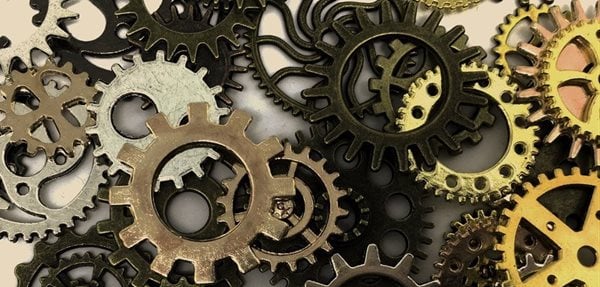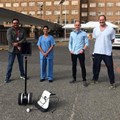The argument has been won. Now it’s just a question of how quickly our country can embrace 4IR.
The First Industrial Revolution was powered by steam, while the Second Industrial Revolution was ignited by the power of electricity. Both led to economic growth and massive gains for most European and American societies.
For the countries who took advantage of the new technologies, both revolutions created more jobs than they destroyed.
The Third Industrial Revolution ushered in the Information Age and introduced us to computing, mobile communications and the first wave of the internet. It is virtual and people orientated, and the products of it - Google, Facebook, Twitter, eBay - exist almost entirely online, ubiquitously, without touching the physical world. It tore down communication barriers, made neighbours out of enemies, and enabled China and the Asian Tigers to rocket forward and close the gap with the West to within a hair’s breadth.
During all three of these revolutions, Africa was left behind, albeit less so with the introduction of mobile phones in the ’90s.
The Fourth Industrial Revolution is the second wave of the internet. Fuelled by the increasing number of digital connections between people, and between people and things, and between things and other things, 4IR is a mesh of the virtual, social and physical worlds. It is a blurred line between the biological and the digital, between ideas and reality, between the haves and the have-not-yets.
Will we be left behind again? Or will we be able to change everything by jumping on board the 4IR train? And, if we do, what could it mean for us? Here. At the edge of the world. In South Africa.
If we work towards embedding the 4IR in our society, our economy will grow and our people will be in a much more stable, sustainable and more hopeful place.
There will be more jobs, along with more safety and security, education and skills transfer, secondary manufacturing (production) and innovation. We will contribute less and less to climate change and our food supply will be protected. Societies and business will become more inclusive and less defined by race or gender.
Here are 13 ways that 4IR is impacting South Africa.
- We’ll behave better
Today there are cameras everywhere and more people connected to the internet who has access to what they film. Accountability in high definition. Everything exists forever and is easily accessible and distributable. Bad behaviour is shared and shamed, so you can’t do anything anymore without risking public exposure.
Would the Gupta brothers have been as brazen if they knew that their business emails were going to be leaked? No. Would Mduduzi Manana have beaten-up two women outside of a Cubana if he knew that the video of it was going to make the rounds? Unlikely. Would Adam Catzavelos have thought twice before throwing around the k-word on his Aryan holiday if he knew what the backlash would feel like? Definitely.
What about Harvey Weinstein? Kevin Spacey? Or James Gunn being fired as the director for Guardians of the Galaxy 3 because Disney and the public took offence to jokes he made on Twitter 10 years ago?
If they didn’t know it then, they – and the rest of the country – definitely do know now.
The national lockdown has revealed thousands of citizens who can think of nothing better than photographing joggers outside of permitted hours, and walkers on beaches.
The knowledge that someone is probably watching, and fear of being reported, is making better citizens of us all. More law-abiding, even if the law is irritating.
You can’t make an ‘apartheid was good’ comment, or an illicit arms deal happen, or swap sex for acting jobs, without everyone finding out and reacting.
The veil of anonymity has been thinned out to almost nothing. We are living in a mega-society that behaves like a small town where everyone knows you. Don’t smoke on the corner, don’t cheat on your wife, don’t leave your dead dog on the road, don’t build a fire pool.
Don’t walk on the beach.
The internet is watching. Start behaving better.
- We’ll connect faster
Before the internet, how did people make new friends, find love or track down others with (possibly obscure) common interests? At school or university? The Church? The office? A bar?
Online, people are not restricted by geography, gender, sexual orientation, race or religion. This allows them to connect with people that would usually be physically, culturally or socially out of their reach. And connect because of who they truly are, behind the labels we lump onto them.
Social platforms like Mxit specialised in match-making, where users can create a fantasy character to represent him- or herself. In real life, she may be a coloured Muslim living in Mitchells Plain, but on Mxit she could pretend to be a black Christian living in Sea Point.
She – not her circumstances - would define her personality. And her personality, free of restrictions, will define her connections. Facebook groups allow people with common interest and/or problems to have physical and online conversations.
This is a big deal in South Africa, where labels play such an unfortunately big part of our lives, and in keeping us at arm's length of each other. We’ve been intentionally divided on a superficial basis. Now, who we talk to and fall in love with will become less about where we live or the colour of our skin or our beliefs.
Imagine you’ve just met someone new online. Are they black or are they white? Do they live in the city, or out in the sticks? Chiefs supporter? EFF supporter? Tall? Short? Who knows? Who cares? It’s hard to make sweeping assumptions about others when we have so little upon which to base them. We can truly start to know people for who they are and have meaningful discussions about what they think and why. This, my friend, is a good thing.
More people connecting with more people makes for a bridge between communities, and one big community from many little ones.
Bigger communities = better place.
- Education for everyone, about everything, anywhere
There are very good reasons why the poverty cycle is so difficult to break, and education is but one of them. But it may be the most important.
If you can afford to send your child to a good school for a decent education, they can chart their own paths, find a good, well-paying job, and do the same for their own children.
If you can’t…?
Until recently a child at a poor school in a rural community without a library had little chance of competing academically against a child at a more privileged school.
How do you convince a world-class math teacher to live in Butterworth?
But now, thanks to the internet, children at schools with no books and underpaid (often underqualified) teachers can now access vast libraries of information. The same applies to an adult.
Curious about how to manage small business accounts? Youtube.com. Struggling with Math, science or engineering? Try KhanAcademy.org. Want to learn to code software? Udemy has you covered. The history of chemical engineering? Wikipedia.com.
This ‘self-taught’ way of doing things means that cutting-edge software is being developed by coders living in townships. Businesses are being built based on skills learned online from both formal and informal educational institutions. African’s are absorbing global know-how and creating Africans-for-Africa solutions. Don’t believe me? Look up Kelvin Doe whose home-made radio station got him into MIT.
Since the number of possible students in an online course is not a function of physical buildings and physically present teachers, the marginal cost of educating one person will trend towards free.
Until the national lockdown, the concept of online education was being resisted by bureaucrats, headmasters, teachers and parents.
Now that children are not allowed to attend school, all educators have been forced to embrace e-learning. Classes are all online. Teachers are teaching from home, children are learning from home.
It’s a hard reset that will forever change our attitudes. Digital education will no longer be perceived as the poor cousin of traditional classrooms.
Quality, private school education from the screen of a smart device. More people will get educated. That education will be better. The rate at which South Africans will be able to learn will no longer be limited by where they live or what they can afford, and our skills will continue to grow faster than our ability to write and distribute textbooks.
- Safer streets
One of the most common conversations in South Africa is the one about crime; something we locals know more about than most other country’s citizens. But the arrival of 4IR doth not a happy criminal make... The rest of us will start seeing the benefits to our safety very soon and the days of playing off the back foot are finally nearing their end.
4IR is already here in the form of CCTV cameras that proactively detect suspicious vehicles and alert nearby armed response, and this is only going to get better. Communal Wi-Fi cameras will identify criminals by their biometrics before they even commit their next crime, and machine learning will use data to predict when and where crime is most likely to happen, so the police can focus their attention where it is most needed.
4IR will also make us more effectively reactive. Apps like Namola are allowing people to share their GPS coordinates with the police, community groups and private security with the press of a button so they can respond almost instantly. Emergency responders can then be directed to the user along the fastest, least congested route, massively reducing the time taken to arrive.
New connected devices are allowing us to track our possessions. No more arriving home to find the surprise of a missing TV or laptop. It is now possible for you to get notified if something leaves your house at a strange time or if you’re not home. We can even track family members, so we know where they are at any particular time.
The tighter the mesh between people and things becomes, the harder it will become for criminals to cause injury, loss, pain and suffering and the safer we will feel.
- Better democracy
If we want to keep up with the constant changes that 4IR-led innovation will bring then policymakers, policymaking and governance will need to change as fast as our lives are. Fortunately, 4IR is driving this change itself.
4IR is making policymaking adaptive, human-centred, inclusive, sustainable and increasingly frictionless. And policy developments are no longer limited to government, as policy becomes a multi-stakeholder effort.
Public participation is now as much online as it is offline, so everyone can be involved. Platforms like Apolitical connect public servants from different nations to each other, to the private sector and to us, so that we can decide what works, what is important and what is best for us.
So is the election of our leaders, as evidenced by the current president of America.
Americans didn’t vote for Donald Trump. They voted against Hillary Clinton. And they only did this because of the way the voting public felt about the shady ‘backroom politics’ that put her forward as the Democratic Party’s candidate. Trump won because he wasn’t a ‘backroom politics’ guy. His candidacy was transparent. It was what the people wanted.
The same thing is happening elsewhere. A small cabal of establishment power-players can no longer determine the leadership of a country. We all have a voice, and the power to do something meaningful with it.
In 2017 we saw it happen here at the ANC national conference. Jacob Zuma’s cronies were confident of his faction retaining power but, unlike all previous conferences, the delegates were aware of the Zuma improprieties, and ultimately the vote went to Cyril Ramaphosa.
If it weren’t for the internet, that would never have happened. If it weren’t for the internet, Jacob Zuma would still be president of South Africa.
The lockdown has accelerated government accountable via social media due to the immediate implications of emergency regulations.
No sooner is an irrational rule implemented than Twitter explodes and 24hrs later the rule is adapted.
More internet = better government.
- We will get healthier
Many of us are already wearing smartwatches or wristbands that track our steps and sleeping patterns. These are only going to become smarter and more prevalent as the days move on, which will help alleviate the ‘too many people, too few doctors’ problems we have right now.
In the near future, our doctors (and the computing technology that will assist them) will be able to monitor us outside of hospitals to give us more accurate and holistic treatment. As the price of such devices falls, sick people in villages hundreds of kilometres outside of major metropoles can receive the kind of care we’re used to in our GP’s office, because they’ll have all the data they need to identify issues.
Big and thick data processed by basic AI will mean that doctors may not even be completely necessary in the chain, especially for basic, more common things like pregnancy or the ‘flu – so nurses with basic training can do almost the same quality of work in rural areas as specialists. TB and HIV will be diagnosed in minutes by a cheap, reliable piece of tech that’s 3D printed.
Even now, implants send data to smartphones, which upload to the cloud, to be accessed by leading professionals to monitor chronic conditions from different cities. Different countries. Can you imagine what this will mean to the lives of more than half our population?
There’s a company, recently formed, called SensiCardiac. They’ve developed what is, essentially, a pocket-sized cardiologist. Think of it as Shazam for hearts – their tech can identify and diagnose heart problems from a database of over 10,000 different heart sounds.
For those who live in cities, our smartphones and connected fridges will start reminding us to eat more fruit and vegetables, that have automatically been ordered for us online. They will track our caloric intake, heart rate and stress levels, passing that information on to insurance companies and experts (if needed). They will monitor our vitamins and minerals intake and make a recommendation.
Healthcare is going to become smarter and even more connected to our day-to-day life to the point where it will be preventing diseases as well as curing them.









































